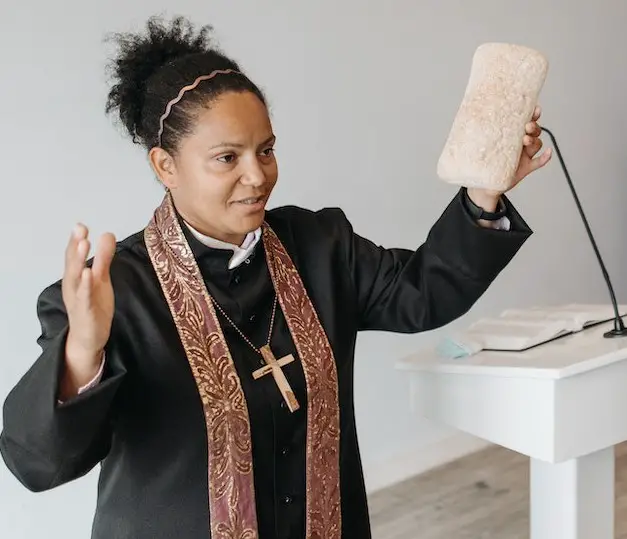Ministers tend to have more administrative duties within a church or religious organization, while pastors’ primary focus is on providing pastoral care to their congregations.
The Definition of a Minister
(Photo by Pavel Danilyuk)

A minister is a person who has been ordained by their religious institution to perform various functions within that community. In Christianity, ministers are often seen as spiritual leaders who serve in roles such as conducting worship services, performing sacraments like baptism and communion, and providing guidance and counseling to members of the congregation.
The term “minister” comes from the Latin word “ministrare”, which means “to serve”. This reflects the role of a minister within their community – they are there to support and serve those around them through acts of compassion, love, and leadership.
In some denominations or faiths, ministers may also be referred to as priests or reverends. However, it’s important to note that these terms can have different meanings depending on the specific religious tradition in question.
A minister is someone who has dedicated themselves to serving their community through spiritual leadership and guidance. They play an important role in helping individuals connect with their faith and find meaning in their lives.
The Definition of a Pastor
(Photo by Pavel Danilyuk)

A pastor is a spiritual leader who guides and shepherds a congregation of believers. The term “pastor” comes from the Latin word “pastor,” which means shepherd. A pastor is responsible for giving sermons, teaching biblical principles, offering counsel to members in need, and providing overall guidance to the church.
A pastor is also someone who serves as a role model for their congregation. They are expected to live according to the teachings of the Bible and set an example for others to follow. Pastors are often viewed as moral leaders within their communities.
While pastors have many responsibilities, one of their most important roles is guiding their congregation through difficult times. Whether it’s helping families cope with loss or offering support during times of crisis, pastors play an essential role in providing comfort and hope when people need it most.
Being a pastor requires dedication, compassion, and an unwavering commitment to serving others. It’s not just a job; it’s a calling that requires selflessness and sacrifice.
Minister Vs. Pastor – Key differences
While the terms “minister” and “pastor” are often used interchangeably, there are some key differences between these two roles. Generally speaking, a minister is someone who has been ordained or licensed to lead religious services and provide pastoral care to their congregation. A pastor, on the other hand, is someone who holds a leadership position within a specific church or community.
One of the main differences between ministers and pastors is their level of authority within their respective organizations. Ministers may work in a variety of settings – including hospitals, prisons or military installations – while pastors typically have more defined responsibilities within one particular church community.
Another difference between ministers and pastors lies in their training and education requirements. While both may hold degrees related to theology or ministry, pastors typically undergo more extensive training that includes courses in business management and leadership skills.
In addition to these differences in authority and education levels, ministers also tend to focus more heavily on spiritual guidance than do pastors. This means that they may spend more time leading worship services or providing counseling sessions for those seeking guidance regarding faith-based issues.
Ultimately, whether you’re looking for spiritual guidance from a minister or seeking out the leadership skills of a pastor will depend largely on your individual needs as well as your personal beliefs about religion and faith.
The responsibilities of a minister
The responsibilities of a minister can vary depending on the denomination and specific role within the church. However, there are some common duties that most ministers share.
One key responsibility is leading worship services, including preaching sermons and conducting baptisms, weddings, and funerals. Additionally, ministers often provide counseling to members of their congregations who are struggling with personal or spiritual issues.
Ministers also play an important role in community outreach and service projects. This may involve organizing volunteer efforts or partnering with other organizations to meet the needs of those in need.
Another important aspect of ministry is teaching and facilitating small group discussions around various topics related to faith and spirituality. Ministers must have a deep understanding of theological concepts as well as effective communication skills to impart this knowledge upon others.
Ministers are responsible for overseeing the administration and management of their respective churches. This includes everything from budgeting to facility maintenance to ensuring compliance with legal requirements.
Being a minister requires a diverse skill set and dedication to serving both one’s congregation as well as the wider community.
The responsibilities of a pastor
The responsibilities of a pastor are varied and complex. A pastor is the spiritual leader of his congregation, responsible for guiding them through their faith journey. One of the main roles of a pastor is to preach and teach the Word of God in a way that is relevant and meaningful to his congregation.
In addition to preaching, pastors also provide pastoral care to their congregants. This can include visiting people who are sick or homebound, counseling those who are struggling with personal issues, and providing guidance on important life decisions such as marriage or career choices.
Another key responsibility of a pastor is to lead worship services. This involves planning and organizing regular church services, including selecting appropriate music and liturgy.
Pastors also have administrative duties such as managing budgets, overseeing staff members and volunteers, fundraising efforts, building maintenance projects etc.
Pastors serve as ambassadors for their churches within the wider community – representing their beliefs publicly while trying to foster positive relationships with other religious organizations or local businesses.
Being a good pastor requires great dedication towards helping others in different aspects like emotional support , spiritual guidance etc . They should be always available whenever someone needs them regardless any time constraint they have , that’s what makes good pastors stand out among others!
Is there a difference between a pastor and a preacher?
A preacher is someone who delivers sermons or religious messages to an audience. They may not necessarily have any formal religious training or be affiliated with a specific church or congregation. Preachers can be found in many different denominations and religions.
On the other hand, a pastor is typically seen as a spiritual leader within a specific congregation or church. They usually have undergone some form of theological education and have been ordained into their position by their denomination.
While preachers may travel from place to place delivering messages, pastors typically remain at one location overseeing the spiritual needs of their congregants. Additionally, pastors often perform sacraments such as baptisms and officiate weddings and funerals.
In essence, while all pastors are preachers in that they deliver sermons to their congregations regularly, not all preachers are pastors because they do not lead a specific congregation.
Can a woman be a pastor?
The question of whether a woman can be a pastor is one that has been asked for centuries. Some religious traditions have allowed women to take on pastoral roles, while others have firmly denied them the opportunity.
In recent years, more and more denominations are beginning to recognize the gifts and talents of women in ministry. In fact, according to a 2019 survey by Barna Group, 87% of Protestant pastors believe that women can serve as pastors in some capacity.
However, there are still many who hold onto traditional beliefs about gender roles within the church. Some argue that scripture prohibits women from having authority over men or preaching in front of mixed-gender congregations.
Despite this opposition, many female pastors continue to break down barriers and lead thriving congregations. They bring unique perspectives and skills to their ministries and play an important role in shaping their communities.
Can a pastor have a wife?
The short answer is yes, a pastor can have a wife. However, this depends on the denomination and church that the pastor belongs to. Some churches require their pastors to be celibate or unmarried, while others allow them to marry.
In some denominations, such as Catholicism, priests are required to take a vow of celibacy and are not allowed to marry. This stems from the belief that dedicating oneself completely to God means abstaining from worldly pleasures like marriage and sex.
However, in most Protestant denominations, pastors are allowed – and even encouraged – to get married. In fact, many churches view marriage as an important part of ministry because it allows pastors to relate better with their congregants who may also be married.
That being said, there may still be certain expectations placed on a pastor’s spouse depending on the church they belong to. They may be expected to attend events or help out with ministries alongside their partner.
Ultimately though, whether or not a pastor has a wife comes down to individual beliefs and practices within each church community.
Featured Image By – Photo by cottonbro studio









